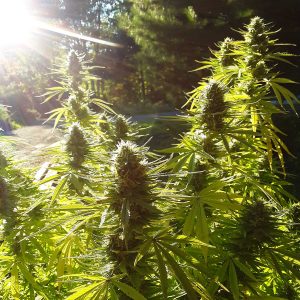Article by: Ed Geis, PhD, Guest Author
Correspondence to: Bald Mountain Botanicals, ed@baldmountainbotanicals.com
Edited by: Zack Brym
This insights article is part of the blog series Perspectives from the Hemp Industry.
Deciding on Organic
Hemp growers have a lot of decisions to make. One is whether to use organic or conventional farming methods. Most choose to go conventional, wary of organic certification hassles or perhaps hesitant about organic agriculture in general. I chose to go organic and thought it might be helpful to share why I made that decision and what my experience has been so far. Growing organic hemp offers some advantages and benefits worth considering.
But first, a caveat: I grow hemp for medicinal CBD in Maine, not Florida, where we have our own particular challenges somewhat different than what Florida hemp growers face. While we don’t share the same soil or climate, there’s also plenty of overlap.
Why did I go organic? A combination of personal values and marketing strategy: I believe in organic and sustainable agriculture and also wanted to differentiate my hemp/CBD business as offering a premium product that’s grown sustainably by a transparent, trustworthy, and responsible grower. To fulfill this vision, I decided to certify everything and display the USDA organic seal on labels.
Sustainable Principles
I made sustainability a central business principle, merging personal values with a marketing angle to help distinguish the brand from many competitors. I started incorporating regenerative agriculture (something I knew little about when I first started), a farming approach that complements and extends organic methods by improving soil and production, enhancing ecosystems, and boosting farm family income. I also generate electricity with solar panels on site, minimize plastic and disposable materials, recycle packaging, and try to burn as little carbon as possible.
I started small, planting less than an acre, in a deliberately cautious approach that I hope to expand and enlarge with time (some folks here “bet the farm” on hemp 3-4 years ago, only to receive a hard dose of reality). Being small has made it easier for me to get familiar with the plant while learning and developing an organic/regenerative approach that produces strong healthy plants and a high-quality harvest.

Organic Advantages
So what are some of the advantages that going organic offers? First, you could get a higher price for your crop, depending on your market. In my case, I sell cured hemp flower plus CBD oil and balm direct to customers, finding that folks are willing to spend a little bit more to buy a product they trust to be safe.
Growing organically can also improve your farm’s soil over time, especially when coupled with regenerative agriculture techniques like no-till. Because you’re adding organic matter and other beneficial materials, improving soil structure, and building a strong, healthy population of microorganisms and soil life, you’re boosting fertility, water and nutrient retention capacity, and general soil health. I’ve gradually changed my mindset from feeding the crop to feeding the soil, and my experience so far has been plants that show resilience against drought, disease, and pests.
Organic farming keeps your groundwater safe from contamination by herbicides, pesticides, and other potentially toxic chemicals, protecting yourself, your family, and potentially the larger community. It also protects nearby surface waters from the same toxins and nutrient overloading from fertilizer runoff.
Consumers also benefit from organic hemp: they’re protected against exposure to synthetic pesticide residues and contaminants while enjoying a high quality product. More and more people are justifiably concerned about toxic substances in hemp/CBD products, for good reason.
Last but not least, organic and regenerative agriculture benefits the larger world community. All of us. By protecting and building your farm’s soil, you join a growing number of farmers ready to end the alarming loss of topsoil worldwide. Organic farming can also reduce demand for fossil fuels (which the conventional chemical fertilizer industry consumes heavily), helping to mitigate climate change. If you practice no-till agriculture, you help reduce carbon emissions even further since untilled soil stores abundant carbon, whereas tilling soil releases carbon into the atmosphere.
Some Caution
Is certification a hassle? Yes, but my experience has been several hours’ time, a few hundred bucks, and a detailed and friendly inspection every year. Customers will look for that USDA seal.
Some of the labor-intensive methods I use would need more automated approaches on a larger scale. But it’s possible to adapt many of these on larger farms, as I’ve seen here in New England. You may or may not decide that organic agriculture makes sense for you, but it’s definitely worth considering.
Resources
“Will Consumer Demand & Producer Considerations Lead to More Organic Hemp?” Hemp Benchmarks, 2021. https://www.hempbenchmarks.com/hemp-market-insider/demand-for-usda-organic-hemp/
“Certified Organic Hemp: A Small but Growing Industry Niche, Fueled by Consumer Demand” Hemp Benchmarks, 2020. https://www.hempbenchmarks.com/hemp-market-insider/certified-organic-hemp-a-growing-industry/
“Organic Hemp and Hemp Products” Organic Trade Association. https://ota.com/advocacy/organic-hemp-and-hemp-products
“Hemp Production Program Questions and Answers” USDA. https://www.ams.usda.gov/rules-regulations/hemp/questions-and-answers
“National Organic Program” USDA https://www.ams.usda.gov/about-ams/programs-offices/national-organic-program
“FAQ – Organic Certification for U.S. Hemp Producers and Handlers” Organic Trade Association. https://ota.com/sites/default/files/indexed_files/FAQ%20Organic%20Hemp%20Certification_Final080121.pdf
“Sustainable Agriculture.” National Institute of Food and Agriculture (USDA). https://www.nifa.usda.gov/topics/sustainable-agriculture
“What is Sustainable Agriculture?” Union of Concerned Scientists, 2022. https://www.ucsusa.org/resources/what-sustainable-agriculture
 1
1
